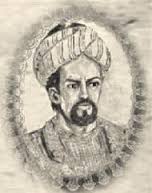By Said Jama Hussein
Abu al-Ala al-Ma’arri, born in Ma’arrat al-No’man, Syria in 973, was a well known Arab philosopher, poet and a writer. Blinded at an early age, he was stern advocate of social justice and lived a secluded, ascetic lifestyle. A rationalist who strongly believed that reason is the chief source of truth.The episode I am going to relate here is regarded by some of Al-Ma’rri’s biographers as most crucial in his life. Undoubtedly, its effect must have been enormous.

Having fallen foul of the ruling authority in Syria on account of his audacious poetry and liberal principles which were considered as heretical and anti-Islam, AL MA’RRI sought sanctuary in Baghdad, a vibrant city famous then for its tolerance and love of arts and literature. There he was warmly welcomed into the Amir’s majestic court, and for the first time in his life, Al Ma’rri had a real taste of what good life actually meant. However, the honeymoon was but short-lived. The Amir’s unbridled loath of Al-Mutanabbi and his poems were irreconcilable with Al Ma’rri’s great admiration of that Arab poet and the deep affection he bore for his poetry.
One day while the Amir was surrounded by a group of his flatterers and sycophants, he started lashing upon Al Mutanabbi’s personal character to the extent of depriving him of even any claim to the elegant art of poetry.
This wanton vilification of Al-Mutanabbi was further aggravated by the ever ready loud clapping and cheering from the attending stooges. Al Ma’rri who was present could not stand it any more. His cool, calculated smart rejoinder was:
“ If Al-Mutnabbi had only said this single verse of poetry in his life-time and nothing more, that would have been enough to immortalise his name as a great poet.”
“ Laki ya manazilu fil qulubi manazilu .. Aqfarti anti wa hunna minki awahilu.”
( Although you may be bereft of inmates, still you – friendly houses- have homes in my heart full of living souls.)
And kept silent waiting for the result. The Amir who despite his haughtiness had a turn for literature, could not see any distinctive praise which this particular verse merited on all accounts. So, he had to look for Al-Ma’rri’s intent elsewhere. He revised in his memory the whole poem with which that verse began and finally, in the middle of the poem, landed at the real one to which Al-Ma’arri the wizard was intelligently alluding to.
“ Idaa atatka madamatii min naaqisen .. Fa hiya ashahaadatu lii biannii kaamilu.”
( should denunciation of my person reach you from the worthless, it is, indeed, a testimony to my perfection.)
The Amir could not resist the seething wrath that overwhelmed his whole being and yelled: ‘ Drag him by his feet and throw him outside the confines of the country.’
That was how Al-Ma’rri, it is said, lost the favour and the bliss of the Court of Baghdad and with it the paradise of Babylon. Thenceforth, he spent the rest of his life in desolation in Ma’rra, his home town, where he later wrote the major part of his most significant literary and philosophical works, among them ‘ The Epistle of Forgiveness’ (Risalat Al-Ghufran) and ‘ Unnecessary Necessity’ (Luzuum Ma La Yalzam).
Said Jama Hussein
Email:sjx@hotmail.co.uk
——
Said Jama Hussein, is an author and analyst on Somali language and literature. Mr. Hussein is the author of numerous books, among them Safar aan Jaho Lahayn. He is also a regular contributor to WardheerNews and the former vice chairman of Somali Pen.


Leave a Reply